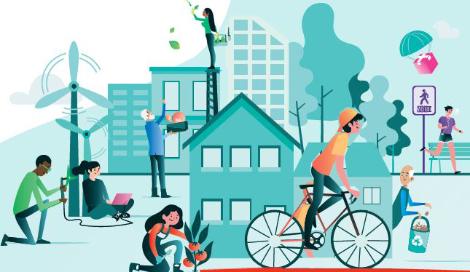Tomorrow my territory 05 Being exemplary with sustainable management of my territory
Eco-Example Action
November 2019
Agence pour l’Environnement et la Maîtrise de l’Energie (ADEME)
The 20 factsheets in the collection « demain MON TERRITOIRE » have been designed to give candidates and elected officials practical keys to take action, to open up the field of possibilities based on the experiences of other elected officials, from small towns to conurbations, large urban areas or sparsely populated areas. In the four corners of France, both in metropolitan France and in the French Overseas Territories, many of them are taking action, together with the players in their territories, to prepare for the future by taking action to mitigate climate change and adapt to its effects. With its knowledge and presence throughout the country, ADEME supports them with its tools, activities and financial aid.

Why is it important to be exemplary in environmental conservation?
The daily activity of a municipality’s services, like that of any organization, leaves an environmental footprint - waste, energy consumption, pollution from travel. By taking steps to reduce these impacts, the community can gain in several ways (economic gains, operating gains, workplace well-being, etc.) and align its commitments and actions. By adopting more virtuous practices, the community also gains experience, consistency and legitimacy. This is essential to exchange with the inhabitants on what can be done at their level by showing that the community itself is making progress. And to convince them to change their habits. This approach implies new management and work organisation choices, investments and, above all, staff mobilisation.
How do you do it?
Becoming an eco-municipality is not a matter of waving a magic wand. There are many facets to the project:
By reducing consumption (energy, water, and overall consumption of all inputs) in buildings in the area,
Favouring alternatives to the private car for business meetings,
By reducing office waste,
By practicing responsible purchasing,
By managing its administrative restaurants better.
-
A diagnosis is made by sifting through the consumption of water, electricity and heating and the kilometres travelled. The quantity of waste produced is also assessed. This is an important step in order to know the perceptions of the agents, identify resistance and reflect with them on actions that will involve them in their implementation.
-
Environmental clauses are included in public procurement contracts: eco-labelled or equivalent products, guarantees of origin for green electricity, service provider in the ISO 14001 process, etc.
-
Municipal employees are made aware of the right actions: double-sided printing of documents so as not to waste paper, putting computers on standby to save electricity, introduction of a bicycle mileage allowance, incentives for travel on public transport, training in eco-driving, training in sustainable communication, etc.
-
We’re changing his purchasing policy. We take the time to assess real needs in order to limit surpluses and waste. We favour robust equipment and rechargeable and reusable consumables rather than disposable equipment. Eco-labelled products are also favoured. Orders are grouped together in order to reduce transport and packaging.
-
The life of a commune is punctuated by different events (festival, sports event, entertainment…). Their organisation is being rethought in order to reduce their impact on the environment. By choosing a place that is accessible by public transport or by bicycle; by going on a waste hunt, by choosing reusable materials for stands and equipment.